Module 5 My school day Unit 1 I love history课件(共46张PPT)
文档属性
| 名称 | Module 5 My school day Unit 1 I love history课件(共46张PPT) |
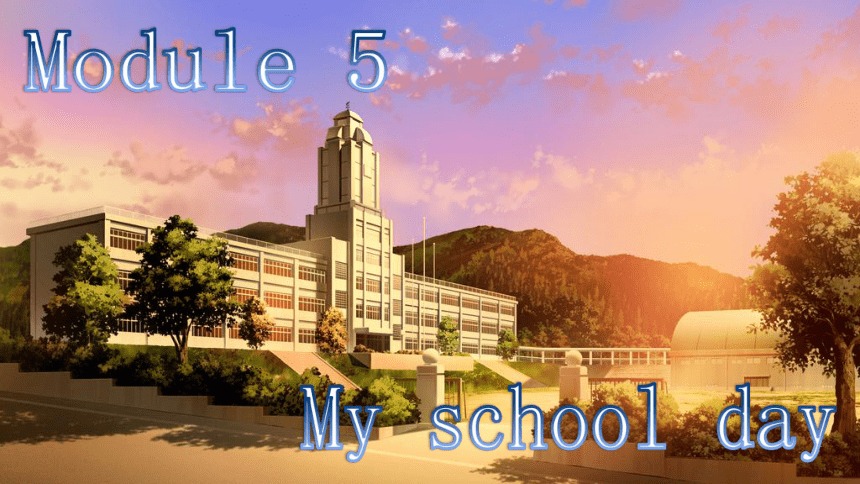
|
|
| 格式 | pptx | ||
| 文件大小 | 3.1MB | ||
| 资源类型 | 教案 | ||
| 版本资源 | 外研版 | ||
| 科目 | 英语 | ||
| 更新时间 | 2023-08-11 20:14:25 | ||
图片预览


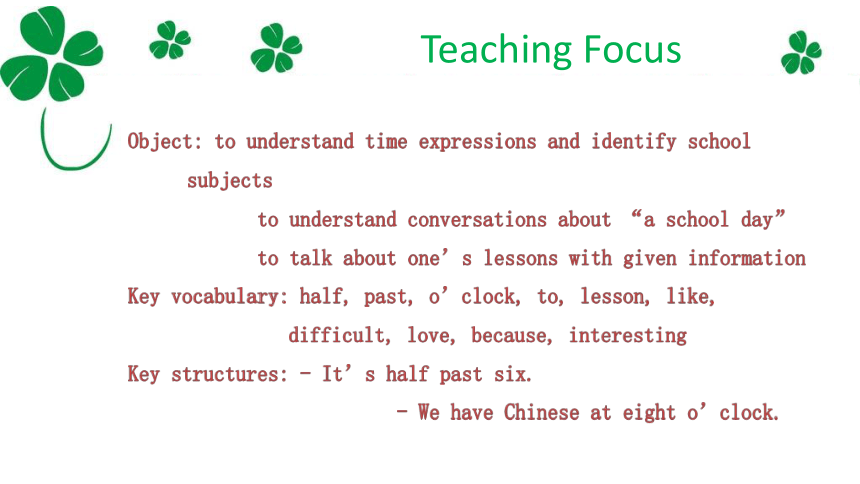
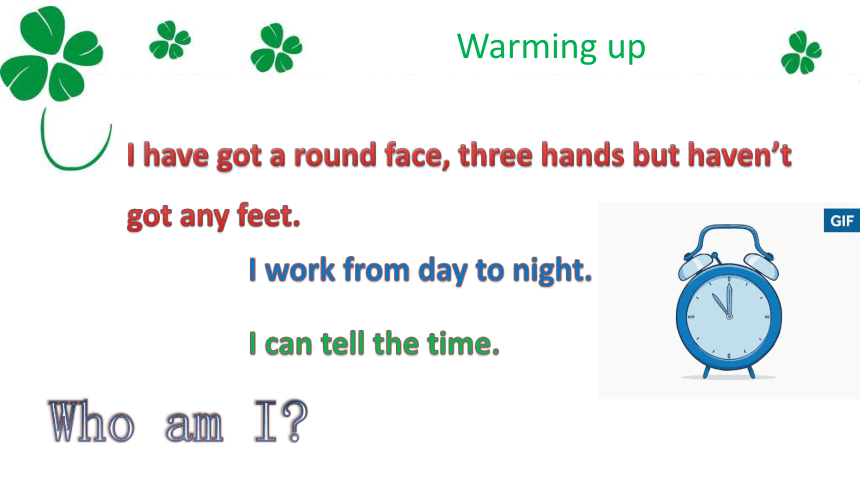
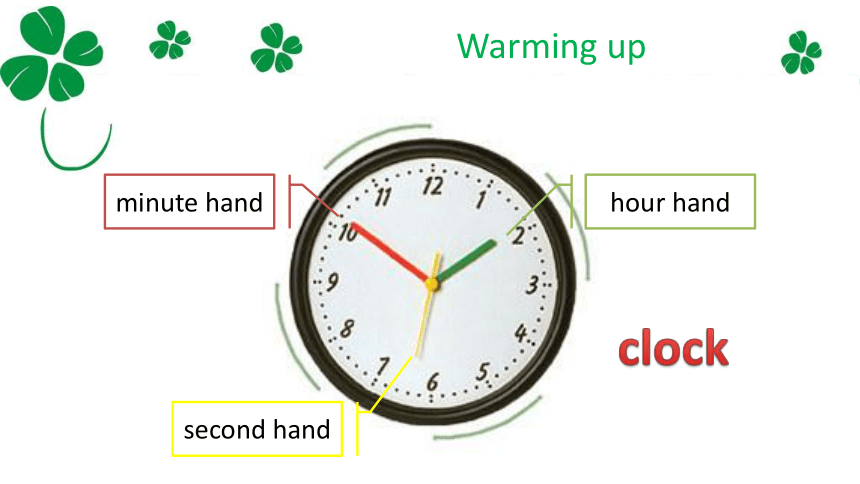
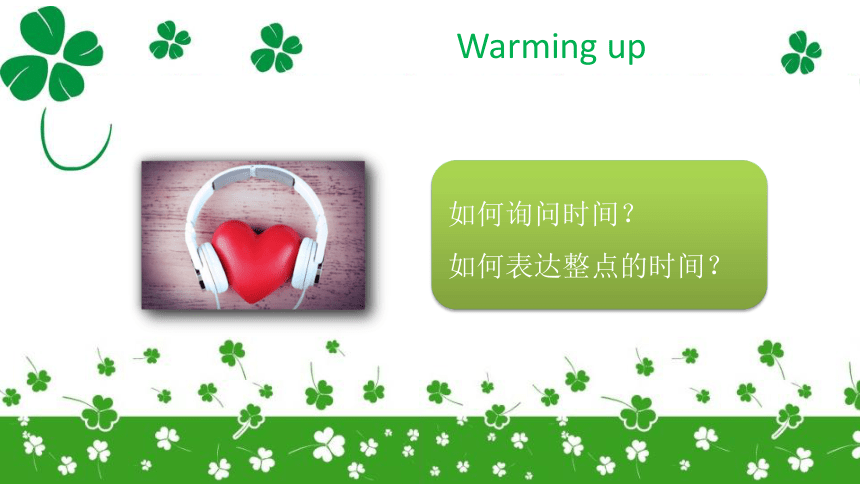
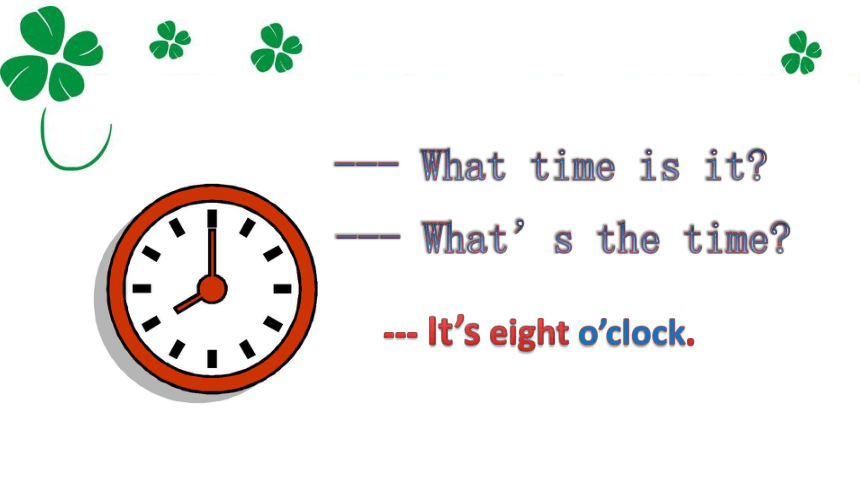
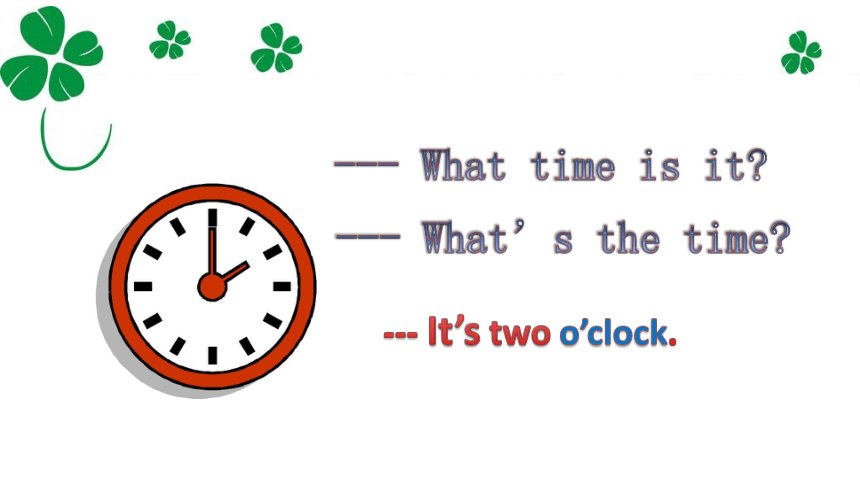
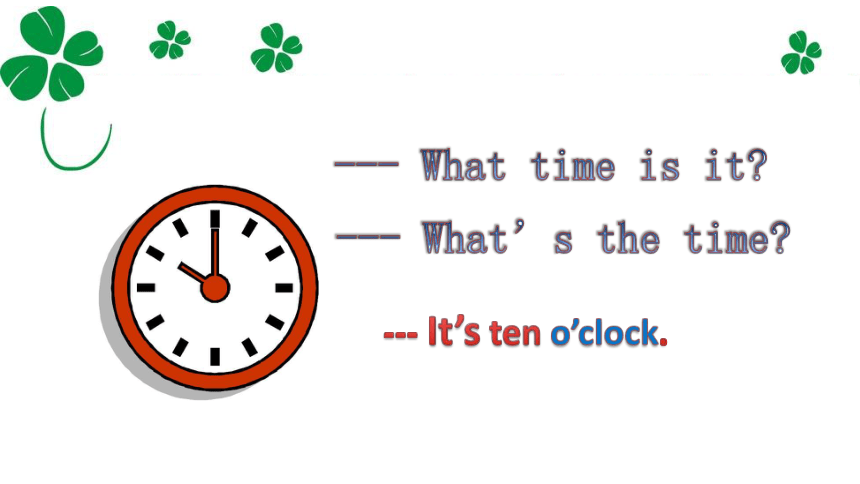
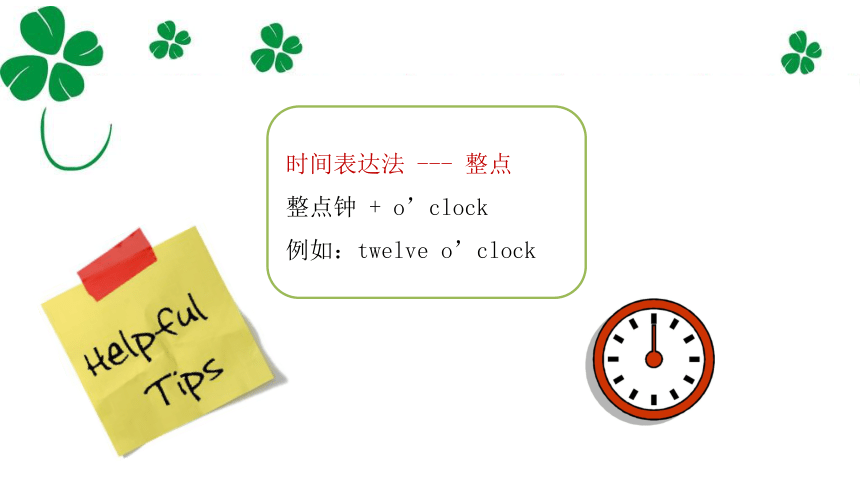
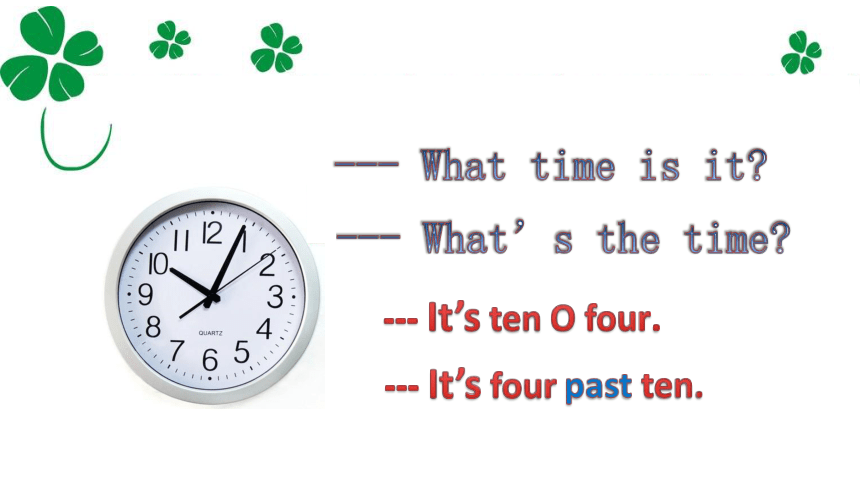
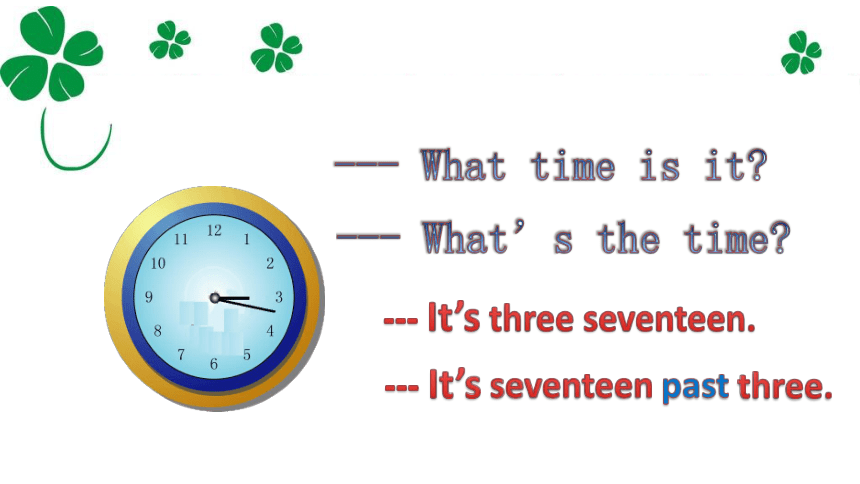
文档简介
(共46张PPT)
Module 5
My school day
Rachel_jiangqi
Unit 1
I love history
Teaching Focus
Object: to understand time expressions and identify school subjects
to understand conversations about “a school day”
to talk about one’s lessons with given information
Key vocabulary: half, past, o’clock, to, lesson, like, difficult, love, because, interesting
Key structures: - It’s half past six.
- We have Chinese at eight o’clock.
Warming up
Who am I
I have got a round face, three hands but haven’t got any feet.
I work from day to night.
I can tell the time.
Warming up
hour hand
minute hand
second hand
clock
Warming up
如何询问时间?
如何表达整点的时间?
--- What time is it
--- What’s the time
--- It’s eight o’clock.
--- What time is it
--- What’s the time
--- It’s two o’clock.
--- What time is it
--- What’s the time
--- It’s ten o’clock.
时间表达法 --- 整点
整点钟 + o’clock
例如:twelve o’clock
--- What time is it
--- What’s the time
--- It’s ten O four.
--- It’s four past ten.
--- What time is it
--- What’s the time
--- It’s three seventeen.
--- It’s seventeen past three.
--- What time is it
--- What’s the time
--- It’s six twenty-five.
--- It’s twenty-five past six.
时间表达法 --- 含有小时和分钟
顺读法:先读小时数,后读分钟数
例:8: 10 eight ten
逆读法:时间未超过30分:
分钟 + past (超过) + 点钟
例:8:10 ten past eight
--- What time is it
--- What’s the time
--- It’s one thirty.
--- It’s half past one.
一半 = 30分钟
--- What time is it
--- What’s the time
--- It’s three thirty.
--- It’s half past three.
--- What time is it
--- What’s the time
--- It’s nine thirty.
--- It’s half past nine.
时间表达法 --- 含有小时和分钟
顺读法:先读小时数,后读分钟数
例:8: 30 eight thirty
逆读法:时间刚好30分:
half + past (超过) + 点钟
例:8:30 half past eight
--- What time is it
--- What’s the time
--- It’s ten forty-one.
--- It’s nineteen to eleven.
--- What time is it
--- What’s the time
--- It’s six forty.
--- It’s twenty to seven.
--- What time is it
--- What’s the time
--- It’s six forty-five.
--- It’s fifteen to seven.
时间表达法 --- 含有小时和分钟
顺读法:先读小时数,后读分钟数
例:8: 45 eight forty-five
逆读法:时间超过30分:
(60-分钟) + to (不到) + (点钟+1)
例:8:45 fifteen to nine
Can you draw the time
twelve to ten
ten past eight
half past eleven
twelve o’clock
half past six
twenty past one
twenty to eleven
Chinese
maths
English
history
art
IT
PE
geography
Chinese
maths
English
history
geography
art
IT
PE
art Chinese English geography history IT maths PE
What is Betty’s favourite subject
A. Chinese B. maths C. history D. English
What is Tony’s favourite subject
A. Chinese B. maths C. history D. English
Tony: Betty, what are our lessons on Monday
Betty: We have Chinese at eight o’clock and science at five to nine. At twenty past ten we have IT. Then we have maths. Do you like maths, Tony
Tony: Yes, I do, but it’s difficult! I like the lessons on Monday afternoon: English and art. What lessons do we have on Friday
Betty: We have English, Chinese, PE and geography.
介词的使用:
at + 时间点
on + 日期
介词的使用:
at + 时间点
例:at eleven o’clock; at half past ten;
at twenty to nine
on + 日期
例:on Monday; on July 9th
Tony: Betty, what are our lessons on Monday
Betty: We have Chinese at eight o’clock and science at five to nine. At twenty past ten we have IT. Then we have maths. Do you like maths, Tony
Tony: Yes, I do, but it’s difficult! I like the lessons on Monday afternoon: English and art. What lessons do we have on Friday
Betty: We have English, Chinese, PE and geography.
lesson 课
difficult 难的
Tony: And in the afternoon Do we have maths
Betty: No, we don’t. We have art and history, but we don’t have maths. I love history and I’m good at it. It’s my favourite subject because it’s very interesting.
Tony: My favourite subject is Chinese. I can talk with my Chinese friends.
介词的使用:
in + 年月 例: in July; in August; in 2016
in + the morning / afternoon / evening
Tony: And in the afternoon Do we have maths
Betty: No, we don’t. We have art and history, but we don’t have maths. I love history and I’m good at it. It’s my favourite subject because it’s very interesting.
Tony: My favourite subject is Chinese. I can talk with my Chinese friends.
be good at … 擅长做某事
例:I am good at swimming.
Are you good at English
Tony: And in the afternoon Do we have maths
Betty: No, we don’t. We have art and history, but we don’t have maths. I love history and I’m good at it. It’s my favourite subject because it’s very interesting.
Tony: My favourite subject is Chinese. I can talk with my Chinese friends.
subject 科目
because 因为
favourite 最喜欢的
interesting 有意思的
I like … because it is …
What’s your favourite subject
interesting
colorful
difficult
useful
Pronunciation and speaking
/u:/
afternoon
moon
noodle
/u/
good
book
look
/ :/
talk
morning
/ /
because
o’clock
what
Language points
动词 have
have 是英语中常见的一个动词,它和不同的词搭配有不同的意思。
例: have lessons 上课
have dinner 吃饭
have a rest 休息
have a good time 玩得愉快
have a look 看一看
否定: don’t have…
例: We don’t have PE lesson on Monday.
疑问: Do / Does sb have …
例: Do you have PE on Monday
Pronunciation and speaking
Mon. Tues. Wed. Thurs. Fri.
8:15 Maths Chinese Chinese Chinese Maths
9:10 PE Maths Maths Maths Art
10:40 Chinese English Geography English English
In the afternoon 2:30 English Art IT PE PE
4:00 History IT Art History Chinese
--- When is your … lesson on …
--- We have … lesson at … on …
Pronunciation and speaking
What time is When is art Chinese English history maths science
I have We / They have I don’t have We / They don’t have at eight o’clock.
at half past eleven.
in the morning.
in the afternoon.
on Monday.
I / They / We like I / They / We don’t like because it’s interesting.
because it’s difficult.
…
Pronunciation and speaking
A: What time is your art lesson
B: I have art at…
A: Do you like art
B: Yes, I do, but… What about you
…
Work in pairs
Test
随堂测试
Module 5
My school day
Rachel_jiangqi
Unit 1
I love history
Teaching Focus
Object: to understand time expressions and identify school subjects
to understand conversations about “a school day”
to talk about one’s lessons with given information
Key vocabulary: half, past, o’clock, to, lesson, like, difficult, love, because, interesting
Key structures: - It’s half past six.
- We have Chinese at eight o’clock.
Warming up
Who am I
I have got a round face, three hands but haven’t got any feet.
I work from day to night.
I can tell the time.
Warming up
hour hand
minute hand
second hand
clock
Warming up
如何询问时间?
如何表达整点的时间?
--- What time is it
--- What’s the time
--- It’s eight o’clock.
--- What time is it
--- What’s the time
--- It’s two o’clock.
--- What time is it
--- What’s the time
--- It’s ten o’clock.
时间表达法 --- 整点
整点钟 + o’clock
例如:twelve o’clock
--- What time is it
--- What’s the time
--- It’s ten O four.
--- It’s four past ten.
--- What time is it
--- What’s the time
--- It’s three seventeen.
--- It’s seventeen past three.
--- What time is it
--- What’s the time
--- It’s six twenty-five.
--- It’s twenty-five past six.
时间表达法 --- 含有小时和分钟
顺读法:先读小时数,后读分钟数
例:8: 10 eight ten
逆读法:时间未超过30分:
分钟 + past (超过) + 点钟
例:8:10 ten past eight
--- What time is it
--- What’s the time
--- It’s one thirty.
--- It’s half past one.
一半 = 30分钟
--- What time is it
--- What’s the time
--- It’s three thirty.
--- It’s half past three.
--- What time is it
--- What’s the time
--- It’s nine thirty.
--- It’s half past nine.
时间表达法 --- 含有小时和分钟
顺读法:先读小时数,后读分钟数
例:8: 30 eight thirty
逆读法:时间刚好30分:
half + past (超过) + 点钟
例:8:30 half past eight
--- What time is it
--- What’s the time
--- It’s ten forty-one.
--- It’s nineteen to eleven.
--- What time is it
--- What’s the time
--- It’s six forty.
--- It’s twenty to seven.
--- What time is it
--- What’s the time
--- It’s six forty-five.
--- It’s fifteen to seven.
时间表达法 --- 含有小时和分钟
顺读法:先读小时数,后读分钟数
例:8: 45 eight forty-five
逆读法:时间超过30分:
(60-分钟) + to (不到) + (点钟+1)
例:8:45 fifteen to nine
Can you draw the time
twelve to ten
ten past eight
half past eleven
twelve o’clock
half past six
twenty past one
twenty to eleven
Chinese
maths
English
history
art
IT
PE
geography
Chinese
maths
English
history
geography
art
IT
PE
art Chinese English geography history IT maths PE
What is Betty’s favourite subject
A. Chinese B. maths C. history D. English
What is Tony’s favourite subject
A. Chinese B. maths C. history D. English
Tony: Betty, what are our lessons on Monday
Betty: We have Chinese at eight o’clock and science at five to nine. At twenty past ten we have IT. Then we have maths. Do you like maths, Tony
Tony: Yes, I do, but it’s difficult! I like the lessons on Monday afternoon: English and art. What lessons do we have on Friday
Betty: We have English, Chinese, PE and geography.
介词的使用:
at + 时间点
on + 日期
介词的使用:
at + 时间点
例:at eleven o’clock; at half past ten;
at twenty to nine
on + 日期
例:on Monday; on July 9th
Tony: Betty, what are our lessons on Monday
Betty: We have Chinese at eight o’clock and science at five to nine. At twenty past ten we have IT. Then we have maths. Do you like maths, Tony
Tony: Yes, I do, but it’s difficult! I like the lessons on Monday afternoon: English and art. What lessons do we have on Friday
Betty: We have English, Chinese, PE and geography.
lesson 课
difficult 难的
Tony: And in the afternoon Do we have maths
Betty: No, we don’t. We have art and history, but we don’t have maths. I love history and I’m good at it. It’s my favourite subject because it’s very interesting.
Tony: My favourite subject is Chinese. I can talk with my Chinese friends.
介词的使用:
in + 年月 例: in July; in August; in 2016
in + the morning / afternoon / evening
Tony: And in the afternoon Do we have maths
Betty: No, we don’t. We have art and history, but we don’t have maths. I love history and I’m good at it. It’s my favourite subject because it’s very interesting.
Tony: My favourite subject is Chinese. I can talk with my Chinese friends.
be good at … 擅长做某事
例:I am good at swimming.
Are you good at English
Tony: And in the afternoon Do we have maths
Betty: No, we don’t. We have art and history, but we don’t have maths. I love history and I’m good at it. It’s my favourite subject because it’s very interesting.
Tony: My favourite subject is Chinese. I can talk with my Chinese friends.
subject 科目
because 因为
favourite 最喜欢的
interesting 有意思的
I like … because it is …
What’s your favourite subject
interesting
colorful
difficult
useful
Pronunciation and speaking
/u:/
afternoon
moon
noodle
/u/
good
book
look
/ :/
talk
morning
/ /
because
o’clock
what
Language points
动词 have
have 是英语中常见的一个动词,它和不同的词搭配有不同的意思。
例: have lessons 上课
have dinner 吃饭
have a rest 休息
have a good time 玩得愉快
have a look 看一看
否定: don’t have…
例: We don’t have PE lesson on Monday.
疑问: Do / Does sb have …
例: Do you have PE on Monday
Pronunciation and speaking
Mon. Tues. Wed. Thurs. Fri.
8:15 Maths Chinese Chinese Chinese Maths
9:10 PE Maths Maths Maths Art
10:40 Chinese English Geography English English
In the afternoon 2:30 English Art IT PE PE
4:00 History IT Art History Chinese
--- When is your … lesson on …
--- We have … lesson at … on …
Pronunciation and speaking
What time is When is art Chinese English history maths science
I have We / They have I don’t have We / They don’t have at eight o’clock.
at half past eleven.
in the morning.
in the afternoon.
on Monday.
I / They / We like I / They / We don’t like because it’s interesting.
because it’s difficult.
…
Pronunciation and speaking
A: What time is your art lesson
B: I have art at…
A: Do you like art
B: Yes, I do, but… What about you
…
Work in pairs
Test
随堂测试
同课章节目录
- Starte
- Module 1 My teacher and my friends
- Module 2 My English lesson
- Module 3 My English book
- Module 4 My everyday life
- Module 1 My classmates
- Unit 1 Nice to meet you.
- Unit 2 I'm Wang Lingling and I'm thirteen years ol
- Unit 3 Language in use.
- Module 2 My family
- Unit 1 Is this your mum?
- Unit 2 These are my parents.
- Unit 3 Language in use.
- Module 3 My school
- Unit 1 There are thirty students in my class.
- Unit 2 The library is on the left of the playgroun
- Unit 3 Language in use.
- Module 4 Healthy food
- Unit 1 We've got lots of apples.
- Unit 2 Is your food and drink healthy?
- Unit 3 Language in use.
- Module 5 My school day
- Unit 1 I love history.
- Unit 2 We start work at nine o'clock.
- Unit 3 Language in use.
- Revision module A
- Module 6 A trip to the zoo
- Unit 1 Does it eat meat?
- Unit 2 The tiger lives in Asia.
- Unit 3 Language in use.
- Module 7 Computers
- Unit 1 How do I write my homework on the computer?
- Unit 2 When do you use a computer?
- Unit 3 Language in use.
- Module 8 Choosing presents
- Unit 1 I always like birthday parties.
- Unit 2 She often goes to concerts.
- Unit 3 Language in use.
- Module 9 People and places
- Unit 1 We're enjoying the school trip a lot.
- Unit 2 They're waiting for buses or trains.
- Unit 3 Language in use.
- Module 10 Spring Festival
- Unit 1 Are you getting ready for Spring Festival?
- Unit 2 My mother's cleaning our houses and sweepin
- Unit 3 Language in use.
- Revision module B
